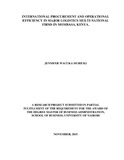| dc.description.abstract | An important challenge faced by the Multinational Logistics Firms (MLF) is to mitigate delays in the implementation of its operations. The international purchasing function is a critical element in the multinational company's (MNC's) formulation of functionally integrated international policy and strategy and the implementation of strategy. A firm should have some understanding of the markets in which it operates as a consumer or buyer, since possible changes in resource or supplier markets can affect decisions related to the firm's marketing, production, and integration strategies. The supply consideration of MNCs represents risk and opportunity and may, as a result, have a significant influence on net income flows, both in the short and long run. Davis et al provides empirical evidence for assuming that the MNC's international procurement process influences and is influenced by its technological process, R & D, and product categories. Given the impact of procurement activities on the operation and effectiveness of the logistics industry, it is essential that these activities be performed by qualified staff with high professional and ethical standards and using sound procedures anchored in appropriate policies and regulations. The study will adopt a census survey/design to analyze the procurement process in the industry. One of the problems faced by logistics professionals over the years is that logistics has been viewed simply as a cost that needs to be reduced. This research study sought to highlight the importance of this element in trade and factors that affect it in regards to operational efficiency. This research contributes to a better understanding of logistics performance through operational efficiency, the interrelationship among procurement dimensions and its impact on the overall organizational performance. These findings provide both theoretical and managerial insights. Procurement related factors that influenced operational efficiency through causing delays are summarized as below. The study recommends methods to overcome some of the identified traditionally bureaucratic challenges ranging from setting up ad-hoc execution or management units to outsourcing project management processes. The study recommends that logistics firms should shorten the mandatory internal procurement processes in order to hasten internal administrative procedures for approvals and monitoring. In addition to the shortened internal controls, the organizations should follow incorporate an integrated information system to cover the entire cycle. | en_US |

